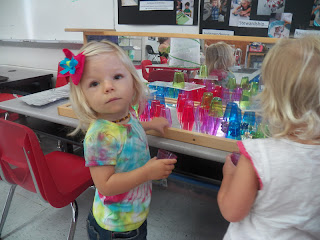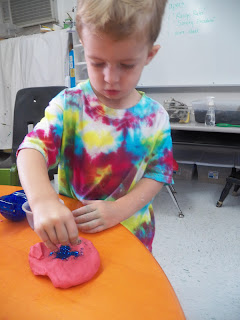Should you play with your little one?
Why?
How do we do it?
Piaget and Vygotsky...2 of my most favorite dudes!
Piaget believed that Imaginative play (or Pretend play) evolved from within the child and when they were developmentally ready, it would emerge.
Vygotsky disagreed... He believed that pretend play came from the child's social interactions with the primary caregiver (at that time...the Mama).
His research indicates that mothers (and other caregivers) seem to naturally steer the child in this direction as language (and often even before) begins to emerge.
We have all pretended that the banana is the phone...
And you get such a reaction of joy from your child that typically we do it again and again for them. And when they imitate this, we are usually very enthusiastic.
Vygotsky believed (and so do I) that in our encouragement of these pretend substitutions and situations...we are setting the groundwork for all future cognitive growth in our children.
It would take me days and days to explain to you the importance of play for young children (and older ones too ;)... and my sadness regarding the way Society has degraded play, commercialized play...
Stolen play from our children.
The effects this has on humans is starting to become very evident.
Sometimes, parents (and teachers) interpret playing with their child as "Teaching" their child. We talk to our children as if they were little machines...just waiting for us to program them with letters and numbers. And if they are able to recite and repeat cute phrases and bits of adult information, we have done our job well.
However, every single piece of research shows that "preschoolers who spend more time at sociodramatic play are advanced in general intellectual development, show an enhanced ability to understand the feelings of others, and are seen as more socially competent by their teachers."
"Young children who especially enjoy pretending also score higher on tests of imagination and creativity. When Play objects are used in novel ways, they encourage the discovery of new relationships and may enhance children's ability to think flexibly and inventively."
Scaffolding Children's Learning by Laura E Berk and Adam Winsler p. 58
"When the important adults in the child's life establish a climate for make-believe, encouraging and accepting the child's imaginings with enthusiasm and RESPECT, they foster creativity."
p. 64
So what do we do with this information...?
Let go of your own Agenda.
Accept that one day your child will learn to read and count...but that day can wait.
As Piaget noticed...Children are biologically driven to Pretend play...
When you interrupt your child's play with a new activity that is unrelated to what they were previously doing or you begin the incessant questioning, instructing, etc...
This leads to immature, simple exploratory play.
p. 68
However, if you follow your child's lead...respond to, guide, and elaborate on your child's behavior...
this shared activity and turn taking results in higher levels of cognitive functioning and pretend play.
I have found that if I sit with my children for about 30 minutes and engage in some joint play and observation...I am rewarded with hours of their own self-initiated play. I don't have to stress that I should be teaching them letters and numbers, etc... I am actually helping them to be more intelligent by just playing Pretend with them.
You will learn so much about your child by playing Pretend with them...And they in turn will see you not simply as the "Computer Programmer" but as a joint partner in this exciting journey we call life.




































































No comments:
Post a Comment